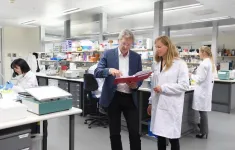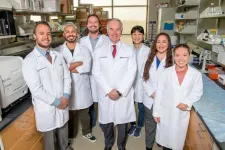(Press-News.org) Fewer than one percent of people who get the flu every year get tested, in part because most tests require trained personnel and expensive equipment. Now researchers have developed a low-cost paper strip test that could allow more patients to find out which type of flu they have and get the right treatment.
The test, developed by a team from the Broad Institute of MIT and Harvard and Princeton University, and supported by the US Centers for Disease Control and Prevention, uses CRISPR to distinguish between the two main types of seasonal flu, influenza A and B, as well as seasonal flu subtypes H1N1 and H3N2. It can also identify strains that resist antiviral treatment, and with further work, could potentially detect swine and avian flu strains, including H5N1, which is currently infecting cattle.
Appearing in The Journal of Molecular Diagnostics, the results could help improve outbreak response and clinical care by bringing tests that are accurate, low-cost, and fast to doctors’ offices and labs across the US and in other countries.
“Ultimately, we hope these tests will be as simple as rapid antigen tests, and they’ll still have the specificity and performance of a nucleic acid test that would normally be done in a laboratory setting,” said Cameron Myhrvold, co-senior author on the study along with Pardis Sabeti, an institute member at the Broad and a professor at Harvard University and the Harvard T.H. Chan School of Public Health, as well as a Howard Hughes Medical Institute investigator. Myhrvold, who is currently an assistant professor at Princeton University, was a postdoctoral researcher in Sabeti’s lab when the study began.
SHINE a light
The test is based on a technology called SHINE, which was developed by Sabeti’s lab in 2020 and uses CRISPR enzymes to identify specific sequences of viral RNA in samples. The researchers first used SHINE to test for SARS-CoV-2, and later to distinguish between the Delta and Omicron variants. Then, in 2022, they began adapting the assay to detect other viruses they knew were always circulating: influenzas. They wanted to create tests that could be used in the field or in clinics rather than hospitals or diagnostic labs with expensive equipment.
“Using a paper strip readout instead of expensive fluorescence machinery is a big advancement, not only in terms of clinical care but also for epidemiological surveillance purposes,” said Ben Zhang, co-first author on the study, a medical student at Harvard Medical School and an undergraduate researcher in Sabeti’s lab when the study began.
Typical diagnostic approaches such as polymerase chain reaction (PCR) require lengthy processing times, trained personnel, specialized equipment, and freezers to store reagents at -80°C, whereas SHINE can be conducted at room temperature in about 90 minutes. Currently, the assay only requires an inexpensive heat block to warm the reaction, and the researchers are working to streamline the process with the goal of returning results in 15 minutes.
The researchers also adapted SHINE to distinguish between different flu strains. In the future, they say the assay could be adapted to detect two different viruses with similar symptoms, such as influenza and SARS-CoV-2.
“Being able to tease apart what strain or subtype of influenza is infecting a patient has repercussions both for treating them and public health interventions,” said Jon Arizti-Sanz, a postdoctoral researcher in Sabeti’s lab and co-first author on the study.
For example, the tests could help clinicians decide whether to use Oseltamivir, a common antiviral that is effective for only some strains, Arizti-Sanz added. In the field, rapid testing could also help scientists collect samples more strategically during an outbreak to better monitor how the virus is spreading.
Next, the researchers are adapting SHINE to test for both avian and swine influenza strains. “With SARS-CoV-2 and now flu, we’ve shown that we can easily adapt SHINE to detect new or evolving viruses,” Arizti-Sanz said. “We’re excited to apply it to H5N1.”
***
About Broad Institute of MIT and Harvard
Broad Institute of MIT and Harvard was launched in 2004 to empower this generation of creative scientists to transform medicine. The Broad Institute seeks to describe the molecular components of life and their connections; discover the molecular basis of major human diseases; develop effective new approaches to diagnostics and therapeutics; and disseminate discoveries, tools, methods and data openly to the entire scientific community.
Founded by MIT, Harvard, Harvard-affiliated hospitals, and the visionary Los Angeles philanthropists Eli and Edythe L. Broad, the Broad Institute includes faculty, professional staff and students from throughout the MIT and Harvard biomedical research communities and beyond, with collaborations spanning over a hundred private and public institutions in more than 40 countries worldwide.
Paper cited
Zhang YB, Arizti-Sanz J, et al. CRISPR-based assays for point of need detection and subtyping of influenza. The Journal of Molecular Diagnostics. Online June 18, 2024. DOI: 10.1016/j.jmoldx.2024.04.004.
END
Simple test for flu could improve diagnosis and surveillance
A low-cost CRISPR-based paper strip test distinguishes between influenza types and can be reprogrammed to recognize different viruses including the H5N1 bird flu virus.
2024-06-21
ELSE PRESS RELEASES FROM THIS DATE:
UT Health San Antonio researcher awarded five-year, $2.53 million NIH grant to study alcohol-assisted liver disease
2024-06-21
SAN ANTONIO, June 21, 2024 – Liver transplants associated with alcohol-related disease are growing at a rapid pace, shifting research to address pathologies behind the ailments in light of a limited supply of organ donors.
At the forefront is Mengwei Zang, MD, PhD, an internationally recognized leader in chronic liver disease research at The University of Texas Health Science Center at San Antonio (UT Health San Antonio) who was just awarded a groundbreaking five-year, $2.53 million grant from the National ...
Giving pre-med students hands-on clinical training
2024-06-21
A group of pre-medical students received valuable hands-on clinical training during a workshop in the new Smart Hospital at The University of Texas at Arlington.
The Clinical Experience Workshop allowed 10 pre-med students to participate in experiential activities and to interact one-on-one with “patients” portrayed by students from the UTA Department of Theatre Arts.
“This was a clinical opportunity for pre-med students with no clinical background to be immersed in clinical medicine, learn basic skills, and experience actual patient encounters with simulated patients ...
CAMH research suggests potential targets for prevention and early identification of psychotic disorders
2024-06-21
A new study by the Centre for Addiction and Mental Health (CAMH), entitled Mental Health Service Use Before First Diagnosis of a Psychotic Disorder and published in JAMA Psychiatry, found that nearly 75 per cent of young Ontarians with a psychotic disorder had at least one mental health service visit within the three years prior to their first diagnosis of the disorder.
The retrospective cohort study—one of the largest of its kind—suggests that youth with a psychotic disorder are nearly four times as likely to have a previous mental health-related hospital ...
Mapping the heart to prevent damage caused by a heart attack
2024-06-21
Scientists at the Victor Chang Cardiac Research Institute in Australia have produced a first of its kind integrated map of heart cells which unlocks the process of cardiac fibrosis – a major cause of heart failure.
The discovery opens new avenues to develop targeted drugs to prevent scarring damage caused after a heart attack.
During and after a heart attack, the heart’s muscles are damaged leading to the formation of scar tissue which lacks the elasticity and contractility of healthy heart muscle. This damage is permanent and can affect ...
Study challenges popular idea that Easter islanders committed ‘ecocide’
2024-06-21
Some 1,000 years ago, a small band of Polynesians sailed thousands of miles across the Pacific to settle one of the world’s most isolated places—a small, previously uninhabited island they named Rapa Nui. There, they erected hundreds of “moai,” or gigantic stone statues that now famously stand as emblems of a vanished civilization. Eventually, their numbers ballooned to unsustainable levels; they chopped down all the trees, killed off the seabirds, exhausted the soils and in the end, ruined their environment. Their population and civilization collapsed, with just a few thousand people remaining when ...
Chilling discovery: Study reveals evolution of human cold and menthol sensing protein, offering hope for future non-addictive pain therapies.
2024-06-21
Chronic pain affects millions worldwide, and current treatments often rely on opioids, which carry risks of addiction and overdose.
Non-addictive alternatives could revolutionize pain management, and new research targeting the human protein which regulates cold sensations, brings scientists closer to developing pain medications that don't affect body temperature and don't carry the risks of addiction.
Research published in Science Advances on June 21, led by Wade Van Horn, professor in Arizona State University’s School of Molecular Sciences and Biodesign ...
Elena Beccalli, new rector of Università Cattolica del Sacro Cuore, takes office on 1st July
2024-06-21
Elena Beccalli will be rector of the Università Cattolica del Sacro Cuore on 1st July for the four-year term 2024–2028. After being appointed by the University's Board of Directors, which convened today, Thursday 20 June 2024, Professor Beccalli succeeds Professor Franco Anelli. She is the first woman appointed to this role in the history of our university.
The decision of the Board of Directors follows the appointment of Professor Elena Beccalli, Dean of the School of Banking, Finance, and Insurance ...
Pacific Northwest Research Institute uncovers hidden DNA mechanisms of rare genetic diseases
2024-06-21
Seattle, WA — June 21, 2024 — Researchers at the Pacific Northwest Research Institute (PNRI) and collaborating institutions have made a groundbreaking discovery that could significantly advance our understanding of genomic disorders. Their latest study, funded by the National Institutes of Health[1] and published in the journal Cell Genomics, reveals how specific DNA rearrangements called inverted triplications contribute to the development of various genetic diseases.
Understanding the Study
Genomic disorders occur when there are changes or mutations in DNA that disrupt normal biological functions. These can lead ...
Empowering older adults: Wearable tech made easier with personalized support
2024-06-21
(Toronto, June 20, 2024) A new review in the Journal of Medical Internet Research, published by JMIR Publications, found that community-dwelling older adults are more likely to continue using wearable monitoring devices (WMDs), like trackers, pedometers, and smartwatches, if they receive support from health care professionals or peers.
The research team from The Hong Kong Polytechnic University, led by Dr. Arkers Kwan Ching Wong, reviewed data from 3 randomized controlled trials involving over 150 older adults. The evaluation showed that the interventions that focused on increasing awareness of being monitored and used collaborative goal-setting and feedback tools, such as the SystemCHANGE ...
Pennington Biomedical researchers partner on award-winning Long Covid study
2024-06-21
Dr. John Kirwan, Executive Director of Pennington Biomedical Research Center, is serving as a co-principal investigator on the Pathobiology in RECOVER of Metabolic and Immune Systems, or PROMIS, study. The study has been awarded more than $802,000 by the National Institutes of Health to identify potential causes of Long COVID.
“The PROMIS study will help us better understand what is driving Long COVID,” Dr. Kirwan said. “In the early days of the pandemic, Pennington Biomedical directed its resources to address the urgent health needs of our population. Now with estimates that more than 25 percent of people in the U.S. who had COVID have experienced ...
LAST 30 PRESS RELEASES:
Yale study challenges notion that aging means decline, finds many older adults improve over time
Korean researchers enable early detection of brain disorders with a single drop of saliva!
Swipe right, but safer
Duke-NUS scientists identify more effective way to detect poultry viruses in live markets
Low-intensity treadmill exercise preconditioning mitigates post-stroke injury in mouse models
How moss helped solve a grave-robbing mystery
How much sleep do teens get? Six-seven hours.
Patients regain weight rapidly after stopping weight loss drugs – but still keep off a quarter of weight lost
GLP-1 diabetes drugs linked to reduced risk of addiction and substance-related death
Councils face industry legal threats for campaigns warning against wood burning stoves
GLP-1 medications get at the heart of addiction: study
Global trauma study highlights shared learning as interest in whole blood resurges
Almost a third of Gen Z men agree a wife should obey her husband
Trapping light on thermal photodetectors shatters speed records
New review highlights the future of tubular solid oxide fuel cells for clean energy systems
Pig farm ammonia pollution may indirectly accelerate climate warming, new study finds
Modified biochar helps compost retain nitrogen and build richer soil organic matter
First gene regulation clinical trials for epilepsy show promising results
Life-changing drug identified for children with rare epilepsy
Husker researchers collaborate to explore fear of spiders
Mayo Clinic researchers discover hidden brain map that may improve epilepsy care
NYCST announces Round 2 Awards for space technology projects
How the Dobbs decision and abortion restrictions changed where medical students apply to residency programs
Microwave frying can help lower oil content for healthier French fries
In MS, wearable sensors may help identify people at risk of worsening disability
Study: Football associated with nearly one in five brain injuries in youth sports
Machine-learning immune-system analysis study may hold clues to personalized medicine
A promising potential therapeutic strategy for Rett syndrome
How time changes impact public sentiment in the U.S.
Analysis of charred food in pot reveals that prehistoric Europeans had surprisingly complex cuisines
[Press-News.org] Simple test for flu could improve diagnosis and surveillanceA low-cost CRISPR-based paper strip test distinguishes between influenza types and can be reprogrammed to recognize different viruses including the H5N1 bird flu virus.





